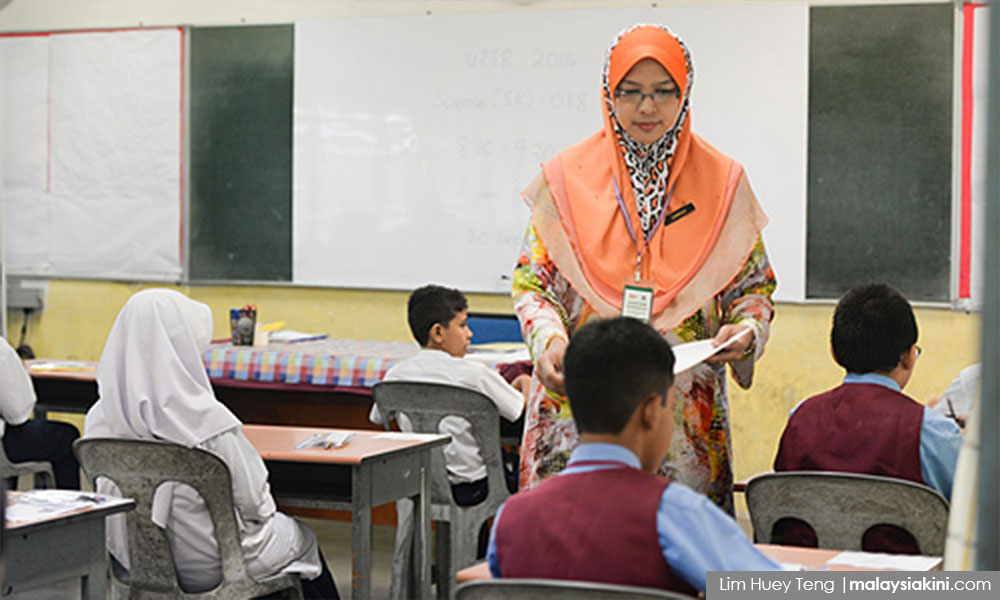Do we sit back and watch another generation suffer or do something?
INTERVIEW | Conceding that the problem is entrenched, Chandran Nair is cognisant of the fact that the path to dismantling institutionalised racism in Malaysia will be long and arduous.
However, the businessperson, author and think-tank founder is convinced that the situation is reversible and refuses to throw in the towel.
“Malaysia is too special a place for us to remain innocent bystanders and allow the meltdown to happen,” Chandran (above) told Malaysiakini in an interview.
Regardless of the scepticism some might harbour towards the cause, he believes there is sufficient potential and goodwill among all the races for change - but he stressed that steps must be taken now to address the issue.
In this regard, Chandran believes the National Unity Ministry is a significant move in the right direction and deserves the support of every Malaysian.
However, he noted that to earn support, the ministry must take steps based on an honest understanding of the root cause of disunity and not have superficial campaigns with feel-good slogans.
“It will take a generation to set things right. So we need a vision for the next 30 years to build a society free of institutional racism. We cannot afford to say 'it is too deep, it cannot be fixed'.
“Along the way, all Malaysians must avoid being racist when discussing the issue and keep long-held prejudices and resentments in check. Most importantly, the young need to be taught so that they reject it - and that starts at home with their parents.
“What is the alternative? Sit back without doing anything and let the next generation suffer as well as the country continues its slide into irrelevance?
“No, we can't. That is a basic obligation arising from being citizens of a nation. I am not saying everyone should be an activist. But we have to understand that even if the rot is deep, we can change it, starting with small individual actions,” he added.
Furthermore, Chandran, who plans to establish the Malaysian Anti-Racism Institute (MARI), said his suggestions are not impractical.
Note to readers: The MARI website will be activated today, May 10, at 5pm.
“It does not involve raising huge funds. It is about having a clear, core mission, setting up a well-run apolitical organisation, ensuring it is multicultural, committed to meritocratic practices and able to offer good research and policy solutions. Simple things but hard work,” he explained.

Quizzed on his vision for the nation, Chandran replied he believes most Malaysians would like to see the country become self-sufficient and resilient with an education system that produces responsible citizens.
“We all want a nation that is free of race-based politics, one that has a national identity everyone can buy into, run along lines of meritocracy, strong institutions, a first-class education system, affirmative action for those in need and zero tolerance for corruption.
“I am often asked what is the purpose of education, which in my view is the key building block. People frequently refer to education as if it is one that will produce entrepreneurs, innovators for the economy – fashionable terms of our times, yet rather meaningless and missing the point.
“What education must set out to do is produce responsible citizens with values and who embrace national identity. These responsible citizens would then feed into an ecosystem of opportunities based on their skill sets, aptitude, ambition and desires to become doctors, lawyers, engineers or teachers, etc.
“But if the ecosystem is institutionally racist, including the education system and the job market, then you have the recipe for disaster,” he added.
Fix the teachers, fix the grades
According to Chandran, who studied biochemical engineering in the UK and later earned a masters in environmental engineering, the Malaysian education system is sliding.
“For the children from the poorer communities, the chances of making it are getting harder. Why is this so? Because the entire teacher training programme is weak and even that is race-based.
“We are not investing in a teacher training programme, especially for primary schools that are world-class. If you do not invest in the education system for the kids, and especially those from the disenfranchised communities, you are sowing the seeds for failure across the board. The proliferation of private schools for the middle class is not a solution and in fact, an indicator of failure as most people cannot afford them.
“So we have many inconvenient truths, which we must face and tackle in the education system. Most people lament the state of our education system – something we can all agree upon – but we seem unable to fix this because we don't have institutions within the government that can, or want to, tackle these thorny policy issues because everything is about 'race'.
“Sadly, the students suffering the most are the Malays and poor Indians. The Chinese, to their credit, have somehow developed a community system that allows them to tap into well-run Chinese schools. But as we are all aware this too can be divisive and the subject of endless political debate,” he added.
Chandran is also critical of the “reverse thinking” in education that attempts to provide more opportunities for disenfranchised Malay children by preferentially lowering standards to ensure more enter tertiary education and gain access to scholarships.
“What you need to do is look into the reasons why the poorer Malay children are lagging behind, even after decades of affirmative action. Why standards are so low in the first place and fix that.
“It is obvious to all that the reason is that the whole system is not one geared towards raising standards but instead towards race quotas, which means that an entire revamp of even teaching quality has been ignored. A whole generation is paying a high price
“It will take a generation to revamp the entire system and the key is investing in a national system that produces high-quality teachers and not lowering standards to pander to race-based policies. The focus must be on increasing standards in tandem.
“When students have access to good teachers, their grades will improve, irrespective of race, and we will be free of discriminatory practices in education which is a very sore point. And while we must all learn Bahasa Malaysia and be proud of the national language, we have to accept that if we want to produce first-class scientists, for example, they need to also be schooled in English – the leading journals are in English, not Bahasa Malaysia, Chinese or Tamil.
“We cannot have differential grading systems and say 'You did not have good grades in science but we will still send you to medical school anyway'. Who wants to be treated by such doctors,” he added.

The new NEP – 'Now Everyone Prospers'
Elaborating on his view of Malaysia in the future, Chandran said political leaders often craft grand blueprints for economic ambitions but lack a vision centred around national identity and one that fully understands the need for building resilience in a post-Covid and resource-constrained 21st century.
“Instead, we hang on to the latest slogan from a Western business school, consulting firm or forum and promote utopian ideas like Industrial Revolution 4.0 (IR4.0), when most of the country is still operating on some pre-industrial model and social cohesion which is the backbone of any nation fraying on a daily basis,” he added.
On this note, Chandran's think-thank, Global Institute for Tomorrow, is working on a paper titled “Best of Both Worlds and the new NEP.”
He explained that the new NEP stands for “Now Everyone Prospers”.
“The idea is to ask the key question: has the pandemic taught us anything and given what we know about the slide, what sort of country do we want for the next generation?
“If we have learnt anything at this juncture, what should we do to revamp the way we manage the country and not simply follow unsuited neo-liberal ideas and outdated economic theories. After all, nobody really understands the extent of the pain arising from the pandemic, not just in Malaysia but around the world. All of this will only become clearer in two to three years and the impacts could last 20 years.
“What is happening in India has probably pushed that country back by 30 or 40 years. This is because India had no real vision, just faith in economic growth to alleviate poverty using archaic development ideas.
“You can't have a vision for a country just based on an economic doctrine. A country needs a vision based on where it stands with regard to the threats, the needs of the people, the constraints it faces and the building of strong institutions.
“So the paper hopes to serve as an 'alternative manifesto' but it is not a political document. It hopes to offer ideas that political parties going into the next election may think worthy of consideration. It would be interesting to read the manifestos of the parties closer to the election and see if any have one that is a departure from the usual stuff.
“But the point is, have we learned anything and do we have a view of what the next 30 years should look like? We have to look at that from a global context too, because we don't live in isolation. There are already signs that we are being left behind, even in the Asean context,” he added.
Building a resilient nation
As for the lessons gleaned from the pandemic thus far, Chandran said, among others, it has shown that “all this globalisation oversimplification is nothing more than smoke and mirrors.
“Fundamentally, you need to build a society that is resilient and self-sufficient in key areas like food, health care, resource management, etc
“Our population is about 34 million and could peak at 40 million in the next 30 years. So, what kind of country do we want, knowing what we know about existential threats such as pandemics, climate change, biodiversity loss, secure food systems and even rising obesity?
“The first thing you have to realise is that there are going to be other existential threats. It is not clear to the public if anyone in the Malaysian government thinks of these threats. The public never hears about what policies are being put in place in these critical areas so that they can be informed and even participate. It is a sign of institutional weakness. All we hear about is 'leap-frogging' in the political landscape.
“For most of our political leaders, climate change is something about environmental management and maybe about planting more trees. Are there robust policies on levelling out carbon emissions by a certain date and putting in place far-reaching policies with regard to transport, agriculture, energy?” he added.

Chandran also cited the example of food supply, suggesting that Malaysia should aspire to become self-sufficient in staple foods in the next decade.
“We are not even self-sufficient in rice.
“Do we think the Thais and Vietnamese will be growing rice for us for the next 30 years or are we so sure there will be some biotech innovation that will solve the food security issues? Is this the way to plan for the future? Imagine the transformation to the economy and the jobs created if we started to set a target for food self-sufficiency?
“On average, Malaysians eat two plates of rice a day. So, if we want to be 100 percent self-sufficient in rice production by 2030, that would be a transformation of the economy. Add to those other foods we could easily produce, for example, chillies,” he added.
However, Chandran said people tend to view farming from a bygone perspective of poor people toiling on the land with their buffaloes.
“We need to start thinking differently about food and agriculture. How we can reorganise the country's entire economy and create many jobs in this process and thereby even help reverse the unsustainable trend of uber-urbanisation in the Klang Valley?
“People think about jobs as essentially white-collar and blue-collar industrial jobs – working in a factory. The common assumption is that the next generation should view success mainly through the lens of getting a higher education to be an entrepreneur or innovator, work in the city, be a lawyer or doctor and somehow aspire to be wealthy. This is not realistic, not even in the most advanced economies.
“But if we view the economy beyond these narrow definitions and have policies to put them into place, we will, for example, create thousands of jobs to manage the food supply chain, keep freshwater supplies clean and do it in ways that these services are properly priced and paid for.
“That reduces the reliance on a poorly managed labour import scheme whilst unemployment rises within the country. The reason rural populations are disenfranchised is because there are no proper policies to pay for their vital service like food production.
“My view of a vision beyond race is that we design an economy around self-sufficiency and resilience. To do this, we have to create a long-term view of how we want society to live within the constraints and preserve them for future generations.
“Then, you look at other key rights issues such as housing, healthcare and the education system so that you create a bold vision that is comprehensive, to which all Malaysians can buy into because it is not race-based or discriminatory,” he added.
Not interested in politics
Apart from this, Chandran rued the lack of Malaysian tradespeople as well, pointing out that foreign workers are now engaged for every task that Malaysians have no interest in, such as even home maintenance.
“If you go to the most industrialised countries in the world. For example, Germany. The backbone of its economy are not entrepreneurs, the backbone is the tradespeople and they earn a good living.
“So we need to create a robust vocational training network across the country, geared towards maintaining high standards in the trades.
“This will, in turn, create employment opportunities for those who have no interest in being or cannot be innovators or entrepreneurs, and all of these need long-term policymaking capabilities,” he added.
Chandran revealed that many people had reached out to him to do something for Malaysia since the 1MDB scandal broke and he thus feels that setting up MARI is one small way to contribute.
However, the businessperson made it clear that he does not want to enter politics and prefers to do his national service from outside the orbit of "toxic" national politics.
Since the first part of this interview, he has received questions on how others can contribute to MARI, and in view of this, Chandran said those interested can send an email with their details to the address on the website. - Mkini
✍ Credit given to the original owner of this post : ☕ Malaysians Must Know the TRUTH
🌐 Hit This Link To Find Out More On Their Articles...🏄🏻♀️ Enjoy Surfing!




















Post a Comment